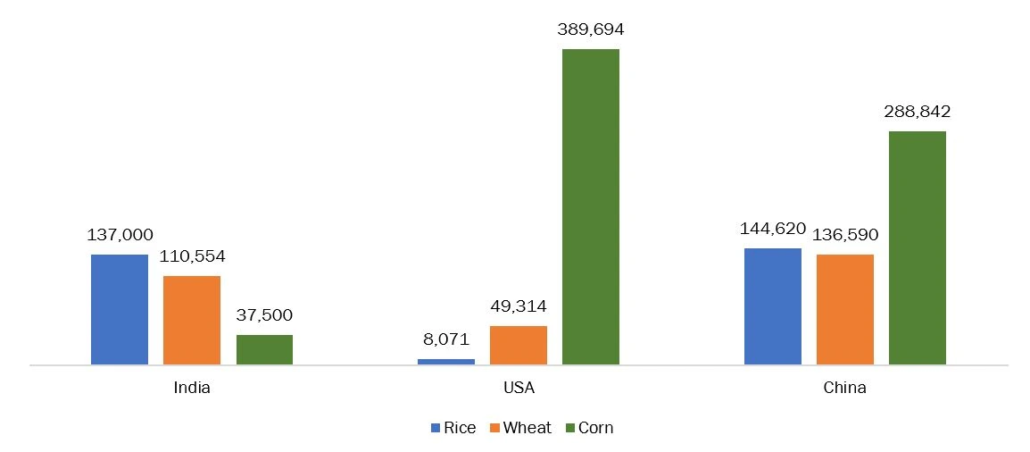The Role of Agrochemicals in Enhancing Crop Yields and Food Security

What Are Agrochemicals and Why Are They Important in Agriculture?
Agrochemicals, also known as agrichemicals, are chemical substances used in agriculture to increase crop yield and enhance crop quality. The two main types of agrochemicals used globally are pesticides and fertilizers. Pesticides are chemicals designed to repel, kill, or manage harmful insects, plants, or animals. They are divided into three categories: herbicides, insecticides, and fungicides. Herbicides stop invasive weeds from growing near crops; insecticides kill harmful insects, and fungicides prevent the growth of fungi on farmland. Fertilizers, on the other hand, enrich soil nutrients, which directly support plant growth. These are classified based on their primary elements—nitrogen, phosphorus, and potassium.Explore the Global Agrochemicals Market
Understand the dynamics of the agrochemicals industry with our comprehensive market report, covering pesticides, fertilizers, and their impact on global agriculture.- ? Detailed Market Size & Growth Forecasts
- ? Key Player Analysis & Market Share
- ? Regional Trends & Application Insights
Benefits of Agrochemicals for Crop Yield and Soil Health
Agrochemicals play a vital role in helping farmers improve crop productivity and protect against pests, diseases, and weeds. They eliminate harmful bacteria and organisms in the soil, enhancing soil health. These chemicals also help regulate the pH balance and nitrate levels in the soil, contributing to healthier crop development. By boosting crop yield per acre, agrochemicals help farmers grow more food on less land, improving farming efficiency. They also reduce overall farm costs by cutting down on the need for additional soil and water treatments, as well as manual labor. However, overuse of agrochemicals may negatively affect crop quality and pose health risks when consumed.Environmental and Health Concerns Linked to Agrochemicals
Despite their advantages, agrochemicals have notable drawbacks. One of the most significant concerns is environmental pollution. Overuse of pesticides and fertilizers can lead to contamination of groundwater and other nearby water sources. Additionally, these chemicals may degrade soil quality over time and disturb the natural nutrient balance in the ecosystem.Understand the Biopesticides Market
Explore sustainable alternatives to traditional agrochemicals with our Biopesticides Market report, detailing eco-friendly solutions and their impact on agriculture.Agrochemical Demand and Crop Production Trends Worldwide
In the global agricultural market, agrochemicals are crucial to meeting rising food demands. Several factors are driving their increased usage: 1. Rising Global Crop Production With growing food demand due to population growth, crop production has surged worldwide. The need for staple food crops such as rice, wheat, and cereals continues to grow, especially as the food and beverage industry expands. 2. Country-Wise Crop Production Statistics (2023–24) According to the U.S. Department of Agriculture’s Foreign Agricultural Service, crop production reached record levels in key agricultural countries in 2023–24. In India, rice production hit 137,000 thousand tons, wheat reached 110,554 thousand tons, and corn totaled 37,500 thousand tons. In the U.S., corn production was around 389,694 thousand tons, with 49,314 thousand tons of wheat and 6,931 thousand tons of rice. China recorded 272,009 thousand tons of corn, 144,620 thousand tons of rice, and 136,590 thousand tons of wheat during the same period. Figure 1: Crop Production in the USA, India, and China, Thousand Tons, 2023-24 Source: US Department of Agriculture
Key Developments
Source: US Department of Agriculture
Key Developments
- In May 2024, BASF introduced its new insecticide in the Australian agricultural market. The Cimegra offers flexible and long-lasting protection to the crops, and it delivers quick and powerful control of insects like the diamondback moth in the farmland.
- In February 2024, Nichino America, Inc., launched its new herbicide, which is aimed for use in rice cultivation in California, USA. The Zembu Herbicide was approved by the California Department of Pesticide Regulation (CDPR) for use in rice for weed control. This herbicide consists of protoporphyrinogen oxidase (PPO), which offers a high efficiency in controlling weeds.
Analyze Crop Protection Chemicals Market
Discover how crop protection chemicals are shaping global agriculture with our in-depth report, covering market trends, innovations, and regional demand.Go from Insight to Action with Our Market Research
You've seen the overview. Now, get the detailed data and strategic analysis you need to stay ahead in the agricultural market. Explore our related, in-depth reports. Each report includes comprehensive data, forecasts, and competitive analysis to empower your business decisions.Get in Touch
Interested in this topic? Contact our analysts for more details.
Latest Thought Articles

Top OSAT Companies Driving Semiconductor Assembly and Test Services Worldwide
Recently
EV Charging Stations Market Outlook: Smart Charging, Fast Charging, and Regional Expansion
Recently
Future of Corporate Wellness: Global Trends and Regional Outlook
Recently
Regional Breakdown of the Mechanical Keyboard Market: Who Leads and Why?
Recently